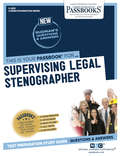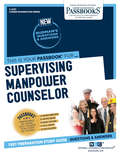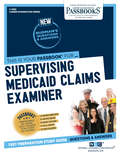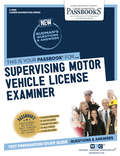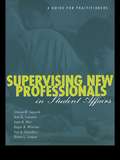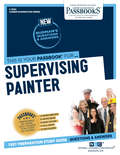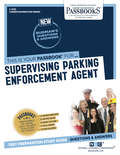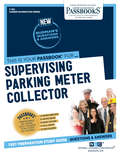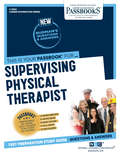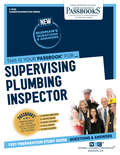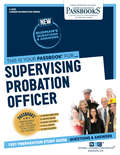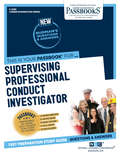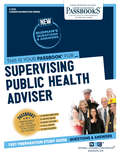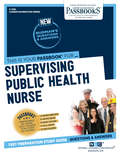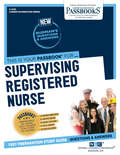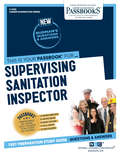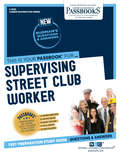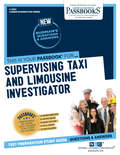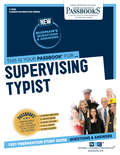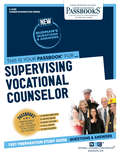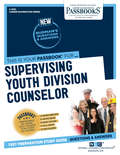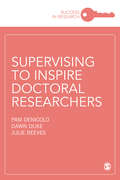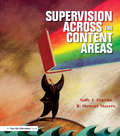- Table View
- List View
Supervising Legal Stenographer: Passbooks Study Guide (Career Examination Series)
by National Learning CorporationThe Supervising Legal Stenographer Passbook® prepares you for your test by allowing you to take practice exams in the subjects you need to study. It provides hundreds of questions and answers in the areas that will likely be covered on your upcoming exam, including but not limited to: spelling; grammar and usage; punctuation; keyboarding practices; office practices; supervision; legal terminology, documents and forms; and other related areas.
Supervising Manpower Counselor: Passbooks Study Guide (Career Examination Series)
by National Learning CorporationThe Supervising Manpower Counselor Passbook® prepares you for your test by allowing you to take practice exams in the subjects you need to study. It provides hundreds of questions and answers in the areas that will likely be covered on your upcoming exam, including but not limited to: problems of the economically disadvantaged, the unemployed, and the underemployed; interviewing; counseling; employment counseling; supervision; administration; and other related areas.
Supervising Medicaid Claims Examiner: Passbooks Study Guide (Career Examination Series)
by National Learning CorporationThe Supervising Medicaid Claims Examiner Passbook® prepares you for your test by allowing you to take practice exams in the subjects you need to study. It provides hundreds of questions and answers in the areas that will likely be covered on your upcoming exam, including but not limited to: Interviewing claimants; Medical terminology; Understanding and interpreting written material; Documents and forms; Preparing written materials; Supervision; and more.
Supervising Motor Vehicle License Examiner: Passbooks Study Guide (Career Examination Series)
by National Learning CorporationThe Supervising Motor Vehicle License Examiner Passbook® prepares you for your test by allowing you to take practice exams in the subjects you need to study. It provides hundreds of questions and answers in the areas that will likely be covered on your upcoming exam.
Supervising New Professionals in Student Affairs: A Guide for Practioners
by Diane L. Cooper Steven M. Janosik Don G. Creamer Joan B. Hirt Roger B. Winston Sue A. SaundersThis handbook explains the rationale behind supervised practice, and addresses design, supervision, and ethical components that are relevant to both faculty teaching supervised practice courses and supervisors overseeing students on-site.
Supervising Painter: Passbooks Study Guide (Career Examination Series)
by National Learning CorporationThe Supervising Painter Passbook® prepares you for your test by allowing you to take practice exams in the subjects you need to study. It provides hundreds of questions and answers in the areas that will likely be covered on your upcoming exam, including but not limited to: supervisory techniques and procedures; safe working practices; proper painting procedures and related tools and equipment; paint failures; relevant trades; and more.
Supervising Parking Enforcement Agent: Passbooks Study Guide (Career Examination Series)
by National Learning CorporationThe Supervising Parking Enforcement Agent Passbook® prepares you for your test by allowing you to take practice exams in the subjects you need to study. It provides hundreds of questions and answers in the areas that will likely be covered on your upcoming exam.
Supervising Parking Meter Collector: Passbooks Study Guide (Career Examination Series)
by National Learning CorporationThe Supervising Parking Meter Collector Passbook® prepares you for your test by allowing you to take practice exams in the subjects you need to study. It provides hundreds of questions and answers in the areas that will likely be covered on your upcoming exam.
Supervising Physical Therapist: Passbooks Study Guide (Career Examination Series)
by National Learning CorporationThe Supervising Physical Therapist Passbook® prepares you for your test by allowing you to take practice exams in the subjects you need to study. It provides hundreds of questions and answers in the areas that will likely be covered on your upcoming exam, including but not limited to; Anatomy and physiology; Principles and practices of physical therapy, including therapeutic methods and equipment; Training of subordinate personnel and students; Supervision; and more.
Supervising Plumbing Inspector: Passbooks Study Guide (Career Examination Series)
by National Learning CorporationThe Supervising Plumbing Inspector Passbook® prepares you for your test by allowing you to take practice exams in the subjects you need to study. It provides hundreds of questions and answers in the areas that will likely be covered on your upcoming exam.
Supervising Probation Officer: Passbooks Study Guide (Career Examination Series #C-2591)
by National Learning CorporationThe Supervising Probation Officer Passbook® prepares you for your test by allowing you to take practice exams in the subjects you need to study. It provides hundreds of questions and answers in the areas that will likely be covered on your upcoming exam.
Supervising Professional Conduct Investigator: Passbooks Study Guide (Career Examination Series)
by National Learning CorporationThe Supervising Professional Conduct Investigator Passbook® prepares you for your test by allowing you to take practice exams in the subjects you need to study. It provides hundreds of questions and answers in the areas that will likely be covered on your upcoming exam.
Supervising Public Health Adviser: Passbooks Study Guide (Career Examination Series)
by National Learning CorporationThe Supervising Public Health Adviser Passbook® prepares you for your test by allowing you to take practice exams in the subjects you need to study. It provides hundreds of questions and answers in the areas that will likely be covered on your upcoming exam, including but not limited to; Communicable disease control, public health, and human behavior; Interviewing and investigation techniques; Preparing and understanding statistical charts; and more.
Supervising Public Health Nurse: Passbooks Study Guide (Career Examination Series)
by National Learning CorporationThe Supervising Public Health Nurse Passbook® prepares you for your test by allowing you to take practice exams in the subjects you need to study. It provides hundreds of questions and answers in the areas that will likely be covered on your upcoming exam, including but not limited to: administration; nursing principles and practices/general nursing; administrative supervision; nursing administration; psychological and social factors in health care; interacting with the public; and other related areas.
Supervising Registered Nurse: Passbooks Study Guide (Career Examination Series)
by National Learning CorporationThe Supervising Registered Nurse Passbook® prepares you for your test by allowing you to take practice exams in the subjects you need to study. It provides hundreds of questions and answers in the areas that will likely be covered on your upcoming exam, including but not limited to: management and supervision of a nursing unit; supervision; integrating services to provide a treatment program; and more.
Supervising Sanitation Inspector: Passbooks Study Guide (Career Examination Series)
by National Learning CorporationThe Supervising Sanitation Inspector Passbook® prepares you for your test by allowing you to take practice exams in the subjects you need to study. It provides hundreds of questions and answers in the areas that will likely be covered on your upcoming exam, including but not limited to: Principles and practices of inspection; Understanding and interpreting written material; Principles of litter and garbage control; Recordkeeping; Administrative supervision; and more.
Supervising Street Club Worker: Passbooks Study Guide (Career Examination Series)
by National Learning CorporationThe Supervising Street Club Worker Passbook® prepares you for your test by allowing you to take practice exams in the subjects you need to study. It provides hundreds of questions and answers in the areas that will likely be covered on your upcoming exam.
Supervising Student Independence: A Research-based Approach to Academic Supervision in Practice
by Maria Zackariasson Jenny MagnussonThis open access book examines the supervision of undergraduate degree projects, with a particular focus on how supervision may contribute to developing student independence and academic literacies. Based on an extensive research project, it uses examples from focus group interviews as well as actual supervision situations, taken from different higher education programmes at several universities in Sweden and Russia. The authors discuss issues such as supervisors’ perceptions and understandings of student independence, the relationship between supervisor and student, the significance of emotions in the supervision process, different supervision tools to foster independence, and the supervisor’s role not only as a guide and helper but also as an assessor of the students’ work. The book will appeal to scholars within the field of teaching and learning in higher education, as well as those from other disciplines who are interested in developing their own supervision practice.
Supervising Taxi and Limousine Investigator: Passbooks Study Guide (Career Examination Series)
by National Learning CorporationThe Supervising Taxi and Limousine Investigator Passbook® prepares you for your test by allowing you to take practice exams in the subjects you need to study. It provides hundreds of questions and answers in the areas that will likely be covered on your upcoming exam.
Supervising Typist: Passbooks Study Guide (Career Examination Series)
by National Learning CorporationThe Supervising Typist Passbook® prepares you for your test by allowing you to take practice exams in the subjects you need to study. It provides hundreds of questions and answers in the areas that will likely be covered on your upcoming exam.
Supervising Vocational Counselor: Passbooks Study Guide (Career Examination Series)
by National Learning CorporationThe Supervision Vocational Counselor Passbook® prepares you for your test by allowing you to take practice exams in the subjects you need to study. It provides hundreds of questions and answers in the areas that will likely be covered on your upcoming exam, including but not limited to; Problems of the economically disadvantaged, the unemployed, and the underemployed; Interviewing; Counseling; Employment counseling; Supervision; and more.
Supervising Youth Division Counselor: Passbooks Study Guide (Career Examination Series)
by National Learning CorporationThe Supervising Youth Division Counselor Passbook® prepares you for your test by allowing you to take practice exams in the subjects you need to study. It provides hundreds of questions and answers in the areas that will likely be covered on your upcoming exam, including but not limited to: counseling; adolescent behavior and development; principles, practices and techniques of youth treatment and rehabilitation; youth program planning, management, and evaluation; and other related areas.
Supervising to Inspire Doctoral Researchers (Success in Research)
by Julie Reeves Dawn Duke Professor Pam DenicoloEarly careers researchers and academics receive little to no on-going training for providing support to doctoral students. In light of this, this book addresses the needs of prospective and current supervisors of doctoral students, by providing you with guidance on: • Engaging with the process of selecting researchers and developing reliable expectations, • Identifying the most effective supervisory style and your role in shaping students&’ skills, • How you can contribute to your students&’ progress and reflective practices, • Your role in the final assessment stages, and how your support can extend beyond their studies. Through a wide range of multidisciplinary case studies, you will find valuable guidance on how to support your students, and be empowered in the process.
Supervising to Inspire Doctoral Researchers (Success in Research)
by Julie Reeves Pam Denicolo Dawn DukeEarly careers researchers and academics receive little to no on-going training for providing support to doctoral students. In light of this, this book addresses the needs of prospective and current supervisors of doctoral students, by providing you with guidance on: • Engaging with the process of selecting researchers and developing reliable expectations, • Identifying the most effective supervisory style and your role in shaping students’ skills, • How you can contribute to your students’ progress and reflective practices, • Your role in the final assessment stages, and how your support can extend beyond their studies. Through a wide range of multidisciplinary case studies, you will find valuable guidance on how to support your students, and be empowered in the process.
Supervision Across the Content Areas
by Sally J. Zepeda R. Stewart MayersYou became a school leader after succeeding in your particular content area and/or grade level. Now you’re responsible for the entire school. You are accountable for everything that goes on, including results from those who teach outside your areas of original expertise. Supervision Across the Content Areas provides tools and strategies to help you effectively supervise all of your teachers, including those in contents areas or grade levels in which you may not have had personal classroom experience. While focusing on four key content areas – Mathematics, Science, English/Language Arts, and Social Studies – this book also provides supervision tools for other content areas (foreign languages, fine arts, physical education, etc.) Also included are tools and strategies to help you supervise teachers who use instructional strategies such as differentiated instruction, Socratic Seminars, cooperative learning, and inquiry apply local and national standards to frame your instructional program.- ensure accountability of teachers who use multiple intelligences, brain-based learning, and other innovations.
